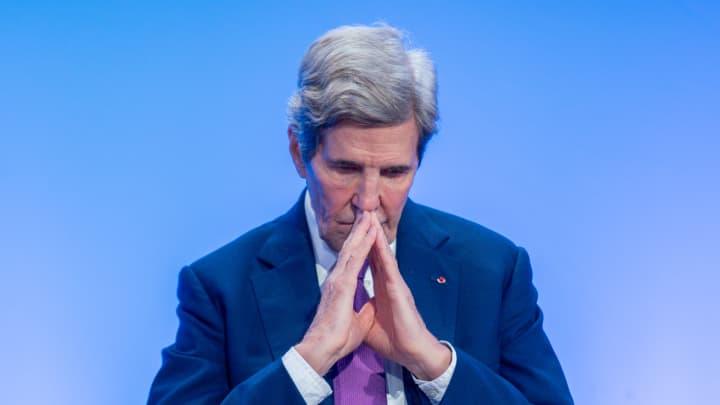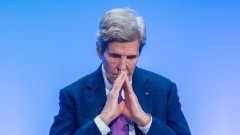
Dubai, UNITED ARAB EMIRATES — U.S. climate envoy John Kerry said countries must prioritize the fight to keep global warming to 1.5°C after it was revealed the COP28 president claimed there was "no science" behind calls for a phase out of fossil fuels.
In comments first on Sunday by The Guardian and investigative journalism organization the Centre for Climate Reporting, COP28 President and United Arab Emirates climate chief Sultan Al-Jaber suggested a fossil fuel phase out would not allow sustainable development "unless you want to take the world back into caves."
The remarks, which were made by Al-Jaber during a live online event on Nov. 21, were described as " " by climate scientists.
Asked to respond to Al-Jaber's comments, Kerry replied, "That's not the argument."
"The G7 countries voted that there should be a phasing out of unmitigated fossil fuel emissions and what there is science for is keeping 1.5 degrees as your North Star," Kerry told CNBC's Tania Bryer at the COP28 climate summit on Sunday.
"Every decision we make should be geared to say, 'does this advance the 1.5 degrees or is it going to be more destructive and take us in the wrong direction?'"
A spokesperson for COP28 told CNBC the story regarding Al-Jaber's comments was "just another attempt to undermine the Presidency's agenda, which has been clear and transparent and backed by tangible achievements by the COP President and his team."
They said Al-Jaber has been "unwavering" in saying that keeping global warming to 1.5°C involves action across a number of areas and sectors. "The COP President is clear that phasing down and out of fossil fuels is inevitable and that we must keep 1.5°C within reach. We are not sure what this story was supposedly revealing. Nothing in it is new or breaking news."
Looking ahead, "the COP President is focused on working with parties to deliver a plan that will deliver maximum transition and minimal disruption for everyone in the world," the spokesperson said.
"He has repeatedly communicated our position on fossil fuels and invited all parties to work together and come up with solutions that can achieve alignment, common ground and consensus."
The spokesperson added that the COP28 host has been "excited with the progress" made so far and for the delivery of a decision on the global stock take. "Attempts to undermine this will not soften our resolve," they said.
For many at the U.N. talks, which is being held in the United Arab Emirates, COP28 can only be recognized as a success if it results in a deal to phase out all fossil fuels, the burning of which is the .
The language of the final agreement, expected by or around the Dec. 12 end of the conference, will be closely monitored. A "phase out" commitment would likely require a shift away from fossil fuels until their use is eliminated, while a "phase down" could indicate a reduction in their use — but not an absolute end.
COP28 had kicked off with an on Thursday, when delegates adopted a new fund to help nations reeling from damages caused by the climate crisis.
A flurry of COP28 announcements since have sought to help decarbonize the energy sector, with nearly 120 governments on Saturday pledging to triple renewable energy capacity by 2030.
However, Al-Jaber's comments marked another embarrassing setback for the COP28 host. It had been in the run-up to the conference that the UAE planned to use its role as host of the climate talks to lobby for oil and gas deals, an allegation a COP28 spokesperson said was inaccurate.
Al-Jaber was seen as a to lead COP28 discussions in Dubai given that he also works as the head of the state-run Abu Dhabi National Oil Company.
"People are arguing that the fossil fuel industry, which is obviously responsible for the emissions that are going up, needs to step up and do more. I think that Sultan Al-Jaber would say that — I say that certainly. They can and must do more in order to solve this problem much more rapidly," Kerry said.
"We are in a race against time, and I know that everybody here does accept that concept," he added.
The 1.5°C temperature threshold is widely recognized as crucial because so-called tipping points become more likely beyond this level. Tipping points are thresholds at which small changes can lead to dramatic shifts in Earth's entire life support system.




